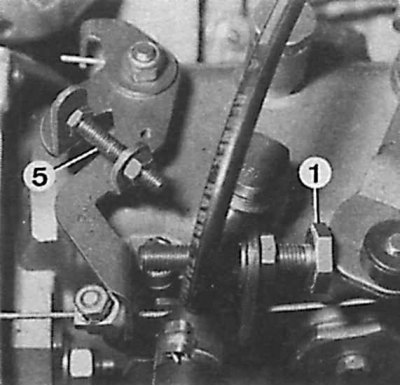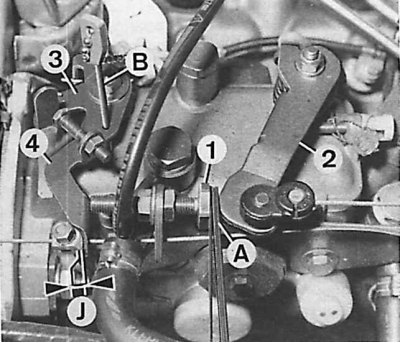Adjusting the idle speed of the Roto Diesel pump

1 - support screw of the minimum number of revolutions,
5 - idle speed screw
Adjustment of the minimum speed and behavior of the engine when the accelerator pedal is suddenly released - Roto Diesel pump

1 - minimum speed support screw, 2 - speed lever, 3 - stop lever, 4 - flow lever, A - plate, B - pin with a diameter of 3 mm
The engine must be warm, the idling rod with an increased number of revolutions must be free (gap J = 0.5–1 mm).
Adjustment of the minimum speed
1. Set the record (A) (see fig. Adjustment of the minimum speed and behavior of the engine when the accelerator pedal is suddenly released - Roto Diesel pump) between the minimum speed support screw and the speed lever (2).
2. Plate thickness (A) should be 3 mm (XUD 9 engine) or 2.5 mm (XUD 7TE engine).
3. Move stop lever (3) and fix it by inserting it into the hole in the flow lever (4) kernel (IN) 3 mm in diameter.
4. Set the engine speed to 900±50 rpm using the minimum speed screw.
5. Remove rod (IN) and a record (A).
Idle adjustment
1. Set the minimum number of revolutions.
2. With base screw (5) (see fig. Adjusting the idle speed of the Roto Diesel pump) set the engine speed to 750–800 rpm.
Checking the behavior of the engine when the accelerator pedal is suddenly released
1. Increase the engine speed to 3000 rpm and quickly release the accelerator pedal linkage.
2. If the engine decelerates too quickly and tends to stop, the minimum speed set screw must be unscrewed (1) (see fig. Adjustment of the minimum speed and behavior of the engine when the accelerator pedal is suddenly released - Roto Diesel pump).
3. If the motor decelerates too slowly, screw in the minimum speed screw by 1/4 turn (1).
4. In both cases, the idle speed should be checked.
Idling check with increased speed
Set lever to end position (4) (see fig. Adjustment of the minimum speed and behavior of the engine when the accelerator pedal is suddenly released - Roto Diesel pump). In this position, the engine speed should be 950±50 rpm (not regulated).
